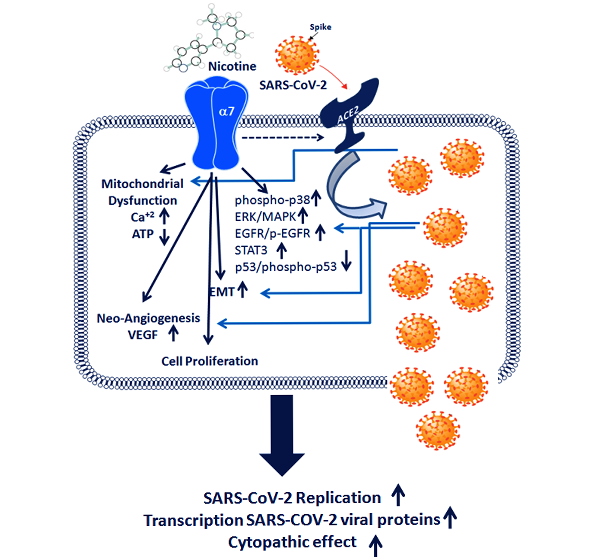(1) Background: Nicotine is implicated in the SARS-COV-2 infection through activation of the α7-nAChR and over-expression of ACE2. Our objective is to clarify the role of nicotine in SARS-CoV-2 infection exploring its molecular and cellular activity. (2) Methods: HBEpC or si-mRNA-α7-HBEpC were treated for 1, 48 h or continuously with 10-7 M Nicotine, a concentration mimicking human exposure to a cigarette. Cell viability and proliferation were evaluated by trypan blue dye exclusion and cell counting, migration by cell migration assay, senescence by SA-beta-Gal activity, and anchorage-independent growth by cloning in soft agar. Expression of Ki67, p53/phospho-p53, VEGF, EGFR/pEGFR, phospho-p38, intracellular Ca+2, ATP and EMT were evaluated by ELISA and/or western blotting. (3) Results: Nicotine induced through α7-nAChR (i) increase in cell viability (ii) cell proliferation; (iii) Ki67 over-expression, (iv) phospho-p38 up-regulation (v) EGFR/pEGFR over-expression; (vi) increase in basal Ca+2 concentration, (vii) reduction of ATP production; (viii) decreased level of p53/phospho-p53, (ix) delayed senescence, (x) VEGF increase, (xi) EMT and consequent (xii) enhanced migration, and (xiii) ability to grow independently of the substrate. (4) Conclusions: Based on our results and on evidence showing that Nicotine potentiates viral infection it is likely that Nicotine is involved in SARS-CoV-2 infection and severity

